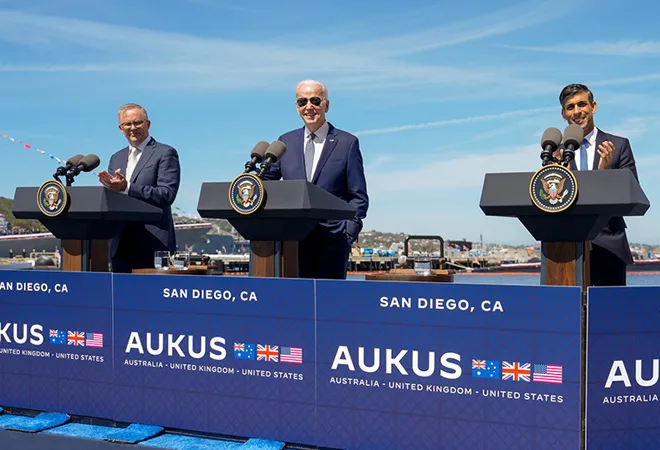-
CENTRES
Progammes & Centres
Location
For all three member countries, the recent San Diego meeting presented both collective and individual opportunities

Last month, the leaders of Australia, the United Kingdom (UK), and the United States (US), Anthony Albanese, Rishi Sunak, and Joe Biden, respectively, gathered in San Diego, California to unpack the AUKUS agreement—the trilateral defence partnership between Australia, the UK, and the US. The three nations first announced their security partnership in September 2021 and have been working on the details of the alliance since then. Recently, the leaders revealed the plan to implement the AUKUS partnership. For all three member countries, the San Diego meeting was more than a review meeting and translated into both collective and individual opportunities.
Australia: A win-win
On 13 March 2023, Australia, the UK and the US unveiled plans to provide Australia with “conventionally armed, nuclear powered attack submarines (SSN)” in the early 2030s to deal with the growing Chinese encroachments in the Pacific. According to the joint statement released, the US is looking to sell Australia three US Virginia class nuclear-powered submarines built by General Dynamics in the early 2030s, with an option of buying two more if needed in the future. The statement also mentions the phased development of the submarine vessel, “SSN-AUKUS”, which will be a “state-of-the-art platform designed to leverage the best of submarine technology from all three nations.” Additionally, from 2027 onwards, there will be rotational presence of one UK Astute class submarine and up to four US Virginia class submarines at HMAS Stirling near Perth, Western Australia.
According to the joint statement released, the US is looking to sell Australia three US Virginia class nuclear-powered submarines built by General Dynamics in the early 2030s, with an option of buying two more if needed in the future.
However, there may be divided opinions on this deal within the strategic community in Australia. Some are concerned about the high cost and funds that Australia will need to pour in. The programme is forecasted to cost US$268 billion to US $368 billion between now and the mid-2050s and will also depend on help from the US and the UK. While Prime Minister Albanese looks at this as “the biggest single investment in Australia’s defence capability in its history and that Australia is also determined to promote security by investing in our relationships across our region,” a few people such as the former Australian Prime Minister, Paul Keating sees the, “AUKUS nuclear-submarine deal as an aggressive attempt to maintain US hegemony in Asia and it has nothing to do with repelling Chinese aggression.” On the other hand, experts like Rory Medcalf of the Australian National University have pointed out that though there will be challenges in reaching the targets set out in the deal, the current geopolitical scenario has to be taken into account, which include “the deterioration of a regional and global order, the rapid growth of China’s military capabilities, the return of war as a global reality, the deep vulnerability of our lifelines to the world, the examples of aggression and coercion by large autocracies against weaker democracies, and the open threats China is making to use force against others.” These factors make such a deal a necessity in the current times.
There have been questions too if this would impede Australia’s sovereignty, in the sense that whether the operation and use of these submarines will make it completely rely on the US. Does this not make it very clear as to which side Australia is on with regards to the US-China tussle? But Australian experts like Bec Strating note that, “Australia’s regional interests are becoming increasingly difficult to disentangle from those of the US. The US alliance should be viewed as a means for securing Australia, not an end.”
UK: Standing “shoulder to shoulder”
The AUKUS announcements during PM Sunak’s visit to San Diego significantly coincided with the release of the United Kingdom’s Integrated Review Refresh, an updated version of the original Integrated Review strategy launched in 2021, that factors in the occurrence of huge geopolitical shifts over the past two years in Britain’s foreign policy approach.
The UK has committed to several actions, including a defence pact with Japan, dialogue status with ASEAN, a new minister for the Indo-Pacific, and deployment of naval assets, as part of its influence, projection, and active presence in the region.
At the heart of IR2021 was the Indo-Pacific tilt, with ambitions that Britain would be the “European partner with the broadest and most integrated presence in the region”. IR2023 not only reinforces this tilt, but further reiterates the Indo-Pacific as a “permanent pillar” of British foreign policy. The UK has committed to several actions, including a defence pact with Japan, dialogue status with ASEAN, a new minister for the Indo-Pacific, and deployment of naval assets, as part of its influence, projection, and active presence in the region.
The most consequential of these expanding engagements and commitments is AUKUS to provide nuclear submarines to Australia using British and American support and technology. While rejuvenating Britain’s defence industrial base, AUKUS is central to the country’s vision for the Indo-Pacific, which aims at fostering a stable and open region and countering what the strategy refers to as the “epoch defining challenge” of China. Sunak’s reference to AUKUS as “the most significant multilateral defence partnership in generations” demonstrates the agreement’s centrality to Britain’s Indo-Pacific vision. As the updated strategy warns of a further deteriorating international security environment, it also acknowledges that “tensions in the Indo-Pacific could have global consequences greater than the conflict in Ukraine”.
Even as the document prioritises the Euro-Atlantic as the most important geography for Britain, prosperity and security in this region are linked to developments in the Indo-Pacific. In this context, a network of “Atlantic Pacific” partnerships is stressed, thereby merging the two strategic theatres. Throughout the strategy, IR2023 emphasises the importance of partnerships, with “likeminded democracies” such as US and Australia, both ranking amongst Britain’s top partners. For Britain, AUKUS is the most important manifestation of this joint approach. Stability in the Indo-Pacific gains even greater salience for post-Brexit Britain where economic ties with the European Union have weakened, compelling the country to increase trade with the rest of the world.
For Britain, AUKUS is the most important manifestation of this joint approach. Stability in the Indo-Pacific gains even greater salience for post-Brexit Britain where economic ties with the European Union have weakened, compelling the country to increase trade with the rest of the world.
Britain has also pledged an increase in its defence budget from the previous 2 percent to 2.25 percent of GDP, granting another 5 billion pounds over a two-year period from which 3 billion pounds is allocated towards strengthening nuclear capabilities, particularly AUKUS. Yet as Sunak promises to stand “shoulder to shoulder” with Australia and the US to maintain Indo-Pacific security, a key question that looms is Britain’s capacity to be a security provider in two simultaneous regions, particularly given the country’s economic crisis and dwindling military stocks resulting from its strong support to Ukraine.
US: Retaining influence
For the US, the San Diego meeting provided not just an opportunity to review progress but more importantly, to plan and speed up the pace of an extremely complex deal in AUKUS. During the meeting, Biden stated that the partnership would help them overcome present and future challenges together, which was readily agreed upon by others. Providing momentum to the AUKUS deal is important for all the three countries as they seek to tide over one of its most outstanding critiques that the deal may take a very long time for its potential advantages to unravel in full scale. Besides the potential delays owing to the involvement of the transfer of nuclear technologies between the three parties, the need to pace up the AUKUS deal is also externally induced due to China’s home-grown rapidity in its naval capabilities which has been witnessed in the past decade, catapulting it to the largest navy in the world in sheer number.
Providing momentum to the AUKUS deal is important for all the three countries as they seek to tide over one of its most outstanding critiques that the deal may take a very long time for its potential advantages to unravel in full scale.
From a strategic standpoint, AUKUS is advantageous for the US for several reasons. Firstly, it strengthens the US-led alliance system in the Indo-Pacific, which is crucial to countering China's growing influence in the region. Secondly, it enhances US access and presence in the region, especially in Southeast Asia, where the US has sought to expand its military footprint. Thirdly, it provides a boost to the US defence industry by creating new opportunities for arms sales and technology transfers to Australia and the UK. Finally, it sends a clear signal to China that the US is committed to defending its allies and interests in the region and is willing to invest in advanced military capabilities to do so.
At the level of leadership, the meeting between the three leaders suggests a consensual roadmap. Two out of three AUKUS countries have had leadership changes since the deal was announced, with successive changes in the UK and the Anthony Albanese government in Australia replacing the Scott Morrison administration. Symbolically, the meeting in San Diego also depicts that the US leadership is likely to steer the AUKUS deal along with the two partners.
Finally, with AUKUS, the Biden administration seeks to consolidate its waning influence in the Pacific theatre. A rapidly rising China has already attempted to pull small islands of the Pacific to its side and has created an unprecedented economic and strategic dependency in the region. Coupled with China’s aggressive strategies are the US’ own leadership pitfalls in the region led by some of the Trump administration’s decisions to weaken its non-NATO alliance network and eroding in the region. The Biden administration has worked on mending partnerships and strengthening alliance in the region. These coupled with a strategic alliance like the AUKUS could reposition the US in the Pacific theatre from a security perspective.
The views expressed above belong to the author(s). ORF research and analyses now available on Telegram! Click here to access our curated content — blogs, longforms and interviews.

Premesha Saha is a Fellow with ORF’s Strategic Studies Programme. Her research focuses on Southeast Asia, East Asia, Oceania and the emerging dynamics of the ...
Read More +
Shairee Malhotra is Associate Fellow, Europe with ORF’s Strategic Studies Programme. Her areas of work include Indian foreign policy with a focus on EU-India relations, ...
Read More +
Vivek Mishra is Deputy Director – Strategic Studies Programme at the Observer Research Foundation. His work focuses on US foreign policy, domestic politics in the US, ...
Read More +